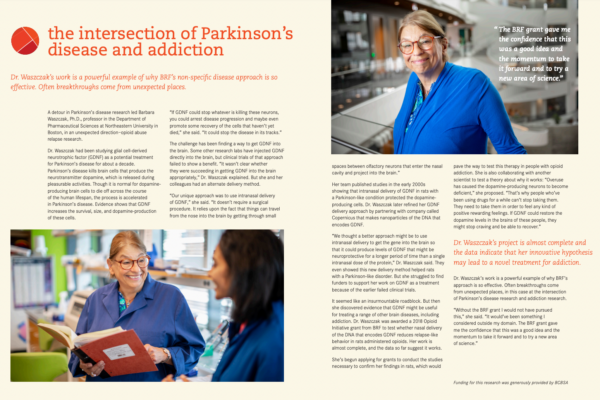
Dr. Waszczak’s work is a powerful example of why BRF’s non-specific disease approach is so effective.
A detour in Parkinson’s disease research led Barbara Waszczak, Ph.D., Professor in the Department of Pharmaceutical Sciences at Northeastern University in Boston, in an unexpected direction, opioid abuse relapse research.
Dr. Waszczak had been studying glial cell-derived neurotrophic factor (GDNF) as a potential treatment for Parkinson’s disease for about a decade. She and her colleagues had an alternate delivery method to what was previously the norm.
Her team published studies in the early 2000s showing that intranasal delivery of GDNF in rats with a Parkinson-like condition protected the dopamine-producing cells. Dr. Waszczak later refined her GDNF delivery method by partnering with a company that makes nanoparticles of the DNA that encodes GDNF. “We thought a better approach might be to use intranasal delivery to get the gene into the brain so that it could produce levels of GDNF that might be neuroprotective for a longer period than a single intranasal dose of the protein,” Dr. Waszczak said, however, she struggled to find funders to back her work on GDNF as a treatment because of the earlier failed clinical trials.
It seemed like an insurmountable roadblock until she discovered evidence that GDNF might help treat many other brain diseases, including addiction. Dr. Waszczak was awarded a 2018 Opioid Initiative grant from BRF to assess whether nasal delivery of the DNA that encodes GDNF reduces relapse-like behavior in rats administered opioids. Her work is almost complete, and the data suggest it works. She has begun applying for grants to conduct the studies necessary to confirm her findings in rats, which would pave the way to evaluate this therapy in people with opioid addiction.
Dr. Waszczak’s work is a profound example of why BRF’s approach is so practical. So often, breakthroughs come from unexpected places, in this case, at the intersection of Parkinson’s disease research and addiction research. “Without the BRF grant, I would not have pursued this,” she said. “It would have been something I considered outside my domain. Instead, the BRF grant gave me the confidence that this was an innovative idea and the encouragement to take it forward and try a new science area.”
Read More: The Intersection of Parkinson’s Disease and Addiction


